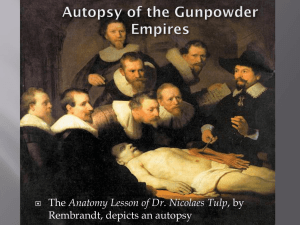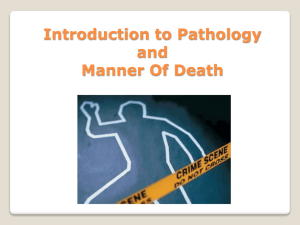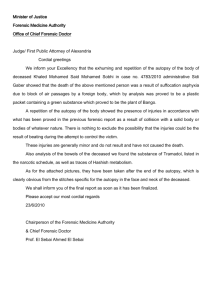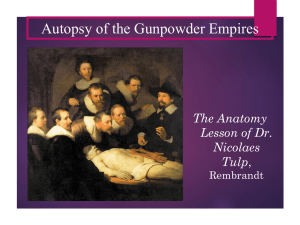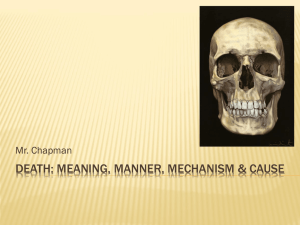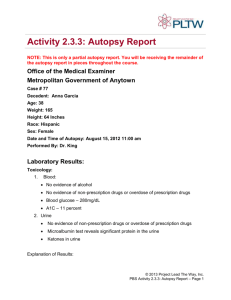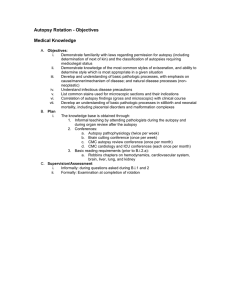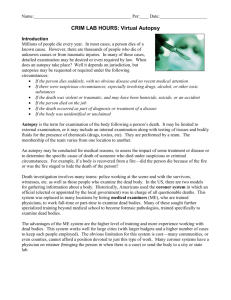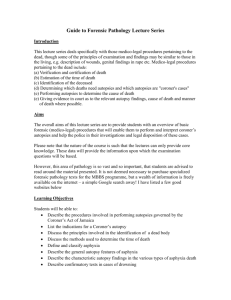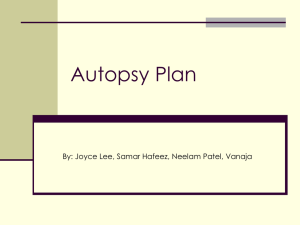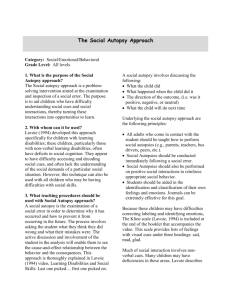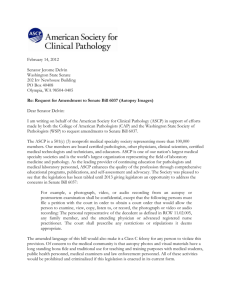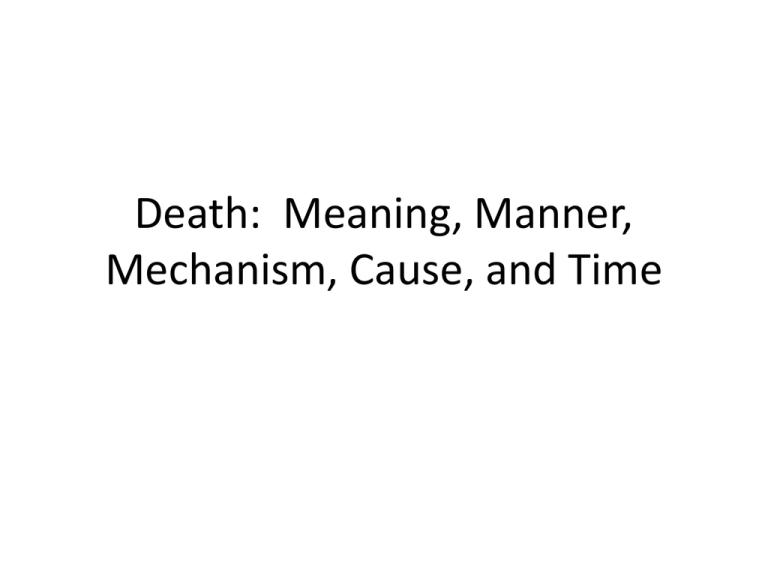
Death: Meaning, Manner,
Mechanism, Cause, and Time
Did You Know?
• As late at the 17th century people were often
buried alive (no stethoscopes)
– Weak heartbeats, coma
• Lead to practice of burying people in coffins
with a bell.
– May have led to the expression, “saved by the
bell!”
Video
Real Life CSI: Crime Autopsy
Death Defined
• Death- Cessation, or end, of life
– Irreversible cessation of circulation of blood
• Heart stops beating and cannot be restarted
• No Oxygen source to cells
– Cessation of brain activity
• Cessation of all brain activity
– Experts do not agree on a single definition of death
• A TOUGH QUESTION- Is a person with a heartbeat alive
even if there is no brain activity?
Stages of Death
• It is difficult to pinpoint the exact point at which someone
has died, death is a process rather than an instant event.
• The moment of death is usually considered the point of no
return
• 2 Stages
– Stoppage- basic processes of body fail to occur
• Caused by lack of oxygen as cells throughout the body begin to die
(No ATP)
• Eventually nerves, muscles, organs and the brain stop working
– Autolysis- Cells breaking down
• As a cell dies it breaks down
• As the cell membrane dissolves, enzymes and other cell contents spill
out and digest surrounding tissues
• Once enough cells begin to break down, life cannot be restarted
Manner of Death
• The manner of death can be…
– Natural- most common
• Interruption and failure of body functions resulting from age or disease.
– Accidental
• Unplanned events such as car accidents or falling from a ladder
– Suicidal
• A person purposely kills oneself
• Can be difficult to determine (accidental vs suicidal)
– Homicidal
• A person or persons kills another person or persons
– Undetermined
• Sometimes the manner of death can be difficult to determine
Questions To Ponder???
• A man with a heart condition is attacked and
dies form a heart attack during the assault. Is
the manner of death accident or homicide?
• An elderly woman dies after being kept form
receiving proper health care from her son.
Cause and Mechanism of Death
• Cause of Death- The reason for the death.
– Disease, physical injury, heart attack ect..
– Blunt force trauma, shooting, strangulation ect…
• Mechanism- is the specific change in the body that
brought about the cessation of life
– Blood lost, pulmonary arrest (heart stops beating) ect…
Forensic Pathology
Investigation of the sudden, unnatural, unexplained or violent
deaths
• Autopsy
– External and internal examination of the body of the deceased person.
• Performed by a specialized medical doctor called a FORENSIC PATHOLOGIST
(commonly known as medical examiner or coroner) in cases of suspicious or
unnatural deaths
• Primary purpose is to determine or confirm…
– Time of Death (TOD)
» can incriminate or exonerate a suspect or person of interest
– Manner, cause and method of death
• May include inspection of stomach contents
– Time of Death
• May also include obtaining biological specimens or tissues from the deceased
for toxicological testing
– Testing for poisons and/or drugs and alcohol
http://australianmuseum.net.au/interactive-tools/autopsy/
The Anatomy Lesson of Dr. Nicolaes Tulp, by
Rembrandt, depicts an autopsy
Also may be involved…
• Forensic Anthropologist
– Identification and examination of human skeletal
remains.
• Entomologist
– Specialists in the study of insects can help determine
time of death.
We’ll talk more about these specialists and their
roles later
Lab Tomorrow
Tomorrow we will be performing an autopsy.
We must familiarize ourselves with the following
anatomical terms

